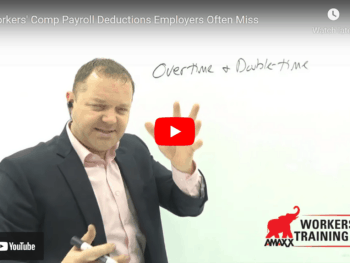If your annual workers compensation insurance premium bill is making your eyes squint when you look at the bill, it may be time to consider self insuring your worker compensation. Self insurance can reduce your overall cost of workers compensation by an average of 20 to 30 percent (your company saves the broker's commission and the insurance companys profit, but you are still paying the cost of the claims and the cost of the claims administration). A broker can help you file for self-insurance, and there is, of course, a fee for that service.
The trade-off is your risk management department will have to take on the role and responsibilities of your insurance broker and insurance company. Plus, unless you are the size of Exxon, Microsoft or Wal-Mart, you will still need to purchase excess insurance to protect your company from catastrophic workers' compensation claims. If you decide to go down the road to self insurance, the following is a road map on how to get there (for a single company, the road map for joining a group self insurance program has additional requirements). (WCxKit)
If you are considering self insurance, you will need to analyze the financial capabilities and capacity of your company – can your company cover the cost of the toll to go down this road? The first action on the road to self insurance is to contact your state government to determine the financial stability and security requirements in your state. Every state government regulates self insurance (North Dakota and Wyoming do not permit self insurance) and each states establishes minimal financial requirements, which can vary significantly. A security deposit is required, normally in the area of $500,000 to $1 million, but it can be higher. The amount of the security deposit is normally determined by your companys current payroll and the classification code for your company. Cash equivalents – letters of credit and security bonds – are acceptable in most states.
If after reviewing your financial capacity to self-insure, you decide you want to proceed with self insurance, you will need to start gathering the documentation you will need for submission to your state department of insurance. While there will be variance in what is required by the different states, you will most likely need the following documentation:
1. the states application for self insurance for workers compensation
2. your current payroll divided by the NCCI classification code or state classification codes
3. your payroll history divided by the NCCI or state classification codes for the last 3 years (up to 5 years in some states)
4. your most recent premium audit from your current worker' compensation insurer
5. your current insurers experience modification factor
6. your incurred lost history for the last 3 years (or 5 years)
7. your independently audited financial statements for the last 3 years (up to 5 years in some states)
8. your business organization documents (corporation, partnership, limited liability company, sole proprietor , etc.)
In addition to the required documentation to be submitted to the state, you should start putting together information on the ways your company will reduce risk and cost when your company is self insured. This would include information on:
1. your safety program [improvements in your loss prevention program any time is a good idea, but will have a substantial positive impact when you are self-insured]
2. your drug-free workplace program [companies with a drug-free workplace program have fewer accidents, resulting in fewer injuries]
3. your return to work program [when injuries do occur, a structured modified duty program will reduce the cost of the work comp claims]. This can include using best practice assessment, and the National Workers Compensation Management Score (NWCMS). An open-ended job return policy is best.
4. your proposed medical management program [when injuries do occur, you will want to have a medical triage program available, plus a nurse case management program for those employees who are unable to return to work within your states indemnity benefits waiting period]
5. your proposed third party administrator to handle your workers compensation claims, or your proposed self-administered claims office. [A selection of the third party administrator based on level of customer service, price, flexibility and workers' compensation claims skill will need to be made. If you decide to self-administer the claims, you will need to hire a claims manager, supervisors, adjusters and support staff, arrange for physical facilities, arrange for a claims management system, etc.]
6. how your company will pay the cost of assessments and taxes [As a self insurer, you will be treated as an insurance company for the purpose of the state department of insurance to collect fees assessed for such things as the assigned risk pool, the second injury fund and the states insurance guarantee fund. Self insured companies are assessed based on claims paid, which is lower than insurance companies who are assessed on premiums collected.] (WCxKit)
While the road to self insurance will at first have a few curves that have to be navigated, it is often a trip worth taking as the benefits of self insurance will make it worthwhile. In addition to the financial savings, self insurance will provide the employer with greater control over the cost of workers compensation, while compelling the self-insured company to improve their safety program, their drug-free workplace program, their return to work program and their medical management program.
Author Rebecca Shafer, JD, President of Amaxx Risks Solutions, Inc. is a national expert in the field of workers compensation. She is a writer, speaker, and website publisher. Her expertise is working with employers to reduce workers compensation costs, and her clients include airlines, healthcare, printing/publishing, pharmaceuticals, retail, hospitality, and manufacturing. See www.LowerWC.com for more information. Contact:RShafer@ReduceYourWorkersComp.com or 860-553-6604.
Author Robert Elliott, executive vice president, Amaxx Risks Solutions, Inc. has worked successfully for 20 years with many industries to reduce Workers Compensation costs, including airlines, healthcare, printing/publishing, pharmaceuticals, retail, hospitality and manufacturing. See www.LowerWC.com for more information. Contact:Info@ReduceYourWorkersComp.com or 860-553-6604.
WC IQ TEST: http://www.workerscompkit.com/intro/
WORK COMP CALCULATOR: http://www.LowerWC.com/calculator.php
SUBSCRIBE: Workers Comp Resource Center Newsletter
Do not use this information without independent verification. All state laws vary. You should consult with your insurance broker or agent about workers comp issues.
©2011 Amaxx Risk Solutions, Inc. All rights reserved under International Copyright Law. If you would like permission to reprint this material, contact Info@ReduceYourWorkersComp.com

























